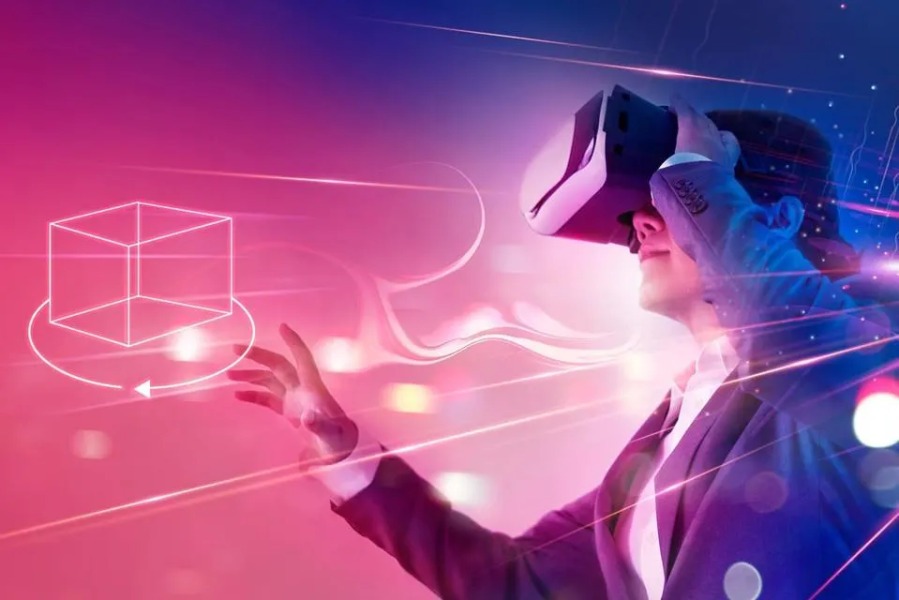4 Ways The Metaverse May (Positively) Impact Your Business Operations
11 October 2023
There is no doubt about it: the next evolution of the internet – characterized by immersive virtual experiences – is already underway. This future internet brings many opportunities for organizations to enhance their internal processes.
Here are four examples of how organizations can harness this more immersive future internet in their business operations.

Selling And Marketing In The Metaverse
The metaverse brings many new ways for brands to engage with their customers – such as immersive brand experiences, exclusive collectibles and brand content such as NFTs, virtual try-on functions, and mega-personalized digital products.
As such, now is the perfect time to experiment with metaverse-based advertising and marketing. For example, you can offer collectible NFTs, like Nike and Coca-Cola have done. Or use NFTs to certify a product's ownership and authenticity–thereby boosting your brand's exclusivity and safeguarding against counterfeit products. You can advertise on billboards in a metaverse platform. Set up a retail or brand space in the metaverse. Create an immersive brand-themed game. Sponsor events and gigs in the metaverse (or hold your own virtual events). And collaborate with influencers and brand ambassadors in new ways.
You can also use the metaverse as a way for customers to carry out transactions – as an alternative to ordering on your website or through an app. For example, Domino’s customers can now order pizza in Decentraland and have it delivered to them in the real world. (McDonalds has plans to do a similar thing.)
You may also want to consider integrating blockchain transactions into the customer journey, as more and more customers expect to pay for goods and services from their digital wallet.
Delivering Customer Support In The Metaverse
Welcome to the age of metaverse customer service – in which businesses can support and communicate with customers in 3D in real-time. This could take many forms. One example is providing immersive instructions to help customers assemble and set up a product, replacing tome-like instruction manuals (or those mystifying IKEA instructions) with 3D product demos in virtual reality (VR). Alternatively, you could use augmented reality (AR) technology to superimpose instructions and actions over the real-world product via the customer’s smartphone. Picture "Press here" showing up on the screen with a big arrow indicating the exact spot on the product where the customer should press…
And when products fail, problems could be diagnosed visually in real-time by remote support staff viewing the product via a video link. Then, they could give AR-enhanced instructions to help the customer fix the issue themselves – no need for the customer to send the product away or take it to a workshop or for technicians to make house calls. Imagine how much time and money this could save the average business.
When it comes to customer service queries, AI chatbots or even human customer service agents could take the shape of virtual avatars that converse with customers in the metaverse. This could help to build stronger customer relationships and provide a more engaging, personal experience (certainly compared to a basic chatbot function).
Making Remote Work More Immersive And Collaborative
I don't know about you, but I'm not a huge fan of the whole Zoom meeting experience. It’s tiring. It can be clunky. And while it met a need during the pandemic, the long-term future of working will require a much more immersive approach to remote meetings and remote working. The good news is, thanks to immersive coworking tools, it’s becoming increasingly possible to feel like you’re in the same room as distant colleagues.
Some companies are going as far as setting up a virtual office – a digital office (which may or may not be a replica of the real-world office), complete with virtual workstations and virtual meeting rooms, accessed via a VR headset. Thanks to metaverse-building tools like Unreal Engine 5, it’s easy to build your own virtual world where colleagues can collaborate. Or you can use a tool like Matterport to create a digital twin of your real-world office space. Or you can make yourself at home in one of the existing metaverse platforms, like Meta’s Horizon Workrooms – an immersive virtual office and meeting room environment. If Meta has its way, Horizon Workrooms will be where we’ll go to do our jobs in the future…
Using Immersive Technologies To improve HR Processes
Recruiting, onboarding, and training can all be enhanced with metaverse technologies. For one thing, the metaverse can provide a novel way to attract and recruit talent. In one example, creative agency BBH Singapore recreated its office virtually in order to host an open-house career fair. By recreating the firm’s actual office, the idea was to give candidates a sense of what it’s really like to work for the company.
The metaverse can also provide a unique way to onboard new hires. Companies like Accenture have already been onboarding staff in the metaverse – with new hires strapping on a VR headset on their first day. The idea is to offer a focused experience for new recruits, allowing them to learn, complete various HR functions and network with colleagues without the distractions of a busy work or home office.
Finally, training and education are becoming much more immersive, thanks to VR and AR. VR, in particular, can provide a highly interactive experience that simulates, well, whatever scenario you want – from serving a difficult customer in a store to dealing with emergency and dangerous situations. Meanwhile, AR can be used to provide more visual instructions and guide employees through specific actions. Such immersive training solutions mean training can be conducted on-site and be highly customized. And because the training is virtual, trainees can make mistakes and learn as they go in a low-risk way.
Related Articles
The Employees Secretly Using AI At Work
Imagine walking into your office and noticing your colleague Sarah effortlessly breezing through her tasks with uncanny efficiency.[...]
Battling AI Fakes: Are Social Platforms Doing Enough?
Since generative AI went mainstream, the amount of fake content and misinformation spread via social media has increased exponentially.[...]
Creating The Universal AI Employee Of The Future
Imagine a world where your most productive employee never sleeps, never takes a vacation, and can seamlessly adapt to any role you need.[...]
20 Generative AI Tools For Creating Synthetic Data
The AI revolution that we’re currently living through is a direct result of the explosion in the amount of data that’s available to be mined and analyzed for insights.[...]
How To Tell Reality From Fiction Amid The AI-Driven Truth Crisis
The artificial intelligence narrative swings between utopian dreams and dystopian nightmares, often overshadowing the nuanced reality of its current capabilities and limitations.[...]
Sign up to Stay in Touch!
Bernard Marr is a world-renowned futurist, influencer and thought leader in the fields of business and technology, with a passion for using technology for the good of humanity.
He is a best-selling author of over 20 books, writes a regular column for Forbes and advises and coaches many of the world’s best-known organisations.
He has a combined following of 4 million people across his social media channels and newsletters and was ranked by LinkedIn as one of the top 5 business influencers in the world.
Bernard’s latest book is ‘Generative AI in Practice’.










Social Media